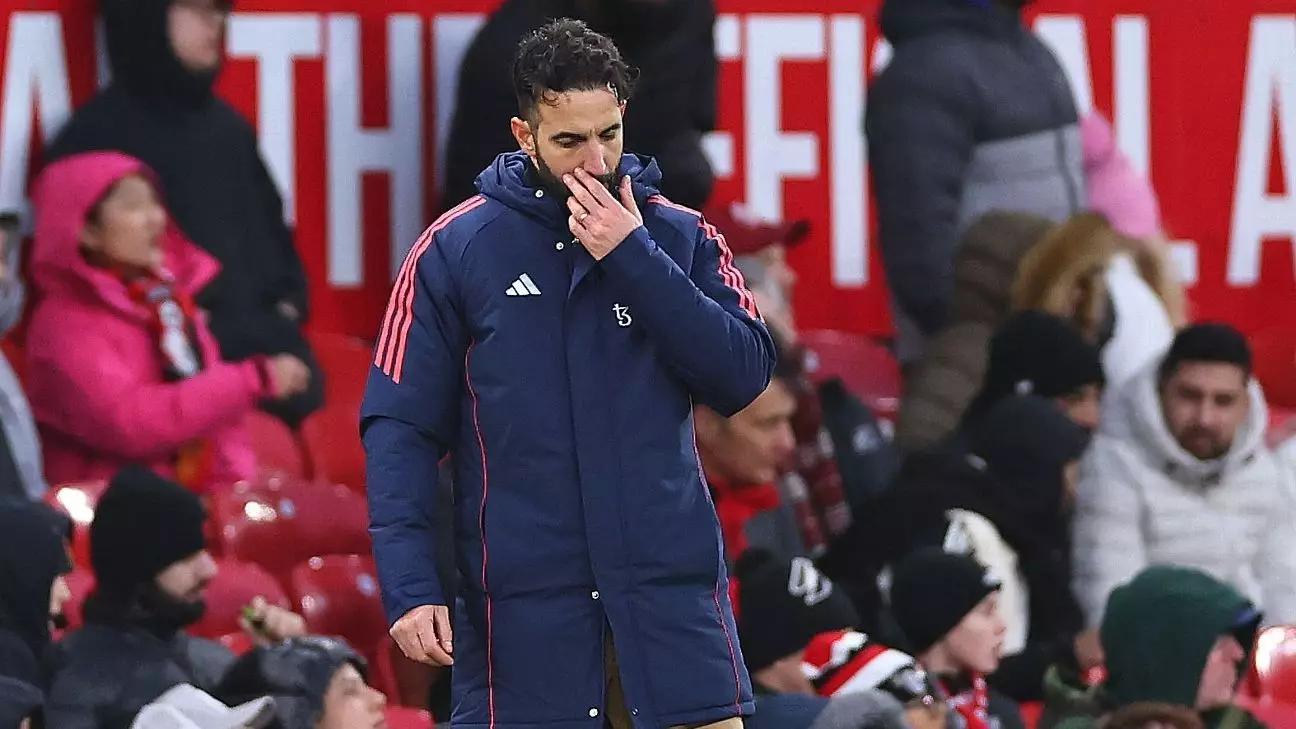Following a disheartening 3-0 defeat to Bournemouth, Manchester United finds itself entrenched in a challenging period, marked by consecutive losses. This latest setback compounds a troubling trend for the club, having recently experienced a heart-wrenching 4-3 defeat to Tottenham in the Carabao Cup. Each match seems to amplify the unease surrounding the once-mighty team, raising questions about their current direction and morale. The situation is particularly concerning for a club of United’s stature, where results carry significant weight and fan expectations are sky-high.
Head coach Ruben Amorim has openly acknowledged the severity of United’s predicament during a recent press conference, labeling it a “tough moment.” His candidness is noteworthy, as it reflects a deeper understanding of the psychological toll such defeats can take on players and supporters alike. The ramifications of losing at home, particularly in front of a passionate Old Trafford crowd, cannot be overstated. The disappointment is palpable, and the mental burden placed upon the players is becoming increasingly evident.
One of the most glaring issues highlighted by Amorim is United’s ongoing vulnerability during set pieces. The team’s defensive frailty was exploited by Bournemouth, who opened the scoring through a well-placed header off a free kick. This incident underscores a broader concern: United has now conceded seven goals from set pieces in their last six matches. Such a statistic speaks volumes about a lack of organization and discipline during critical moments of the game.
Amorim has taken responsibility for these shortcomings, affirming that it is his duty as coach to rectify these defensive lapses. His commitment to addressing these issues is commendable, but it also raises questions about the efficacy of training methods and player preparedness. While Amorim insists that United lost not solely due to set pieces but because of their inability to convert scoring opportunities, the psychological ramifications of conceding early—and often—must not be overlooked. The mounting anxiety among players, as noted by Amorim, seems to affect their on-field decision-making.
The mental aspect of sports is a double-edged sword; confidence is both a crucial asset and a fragile quality. Amorim’s observations regarding the apparent anxiety affecting his players highlight a critical component of athletic performance. The fans are not just passive observers; they are active participants in the game’s emotional landscape. As tension rises within the stands, it often infiltrates the players’ psyche, creating a feedback loop of pressure and uncertainty.
In his assessment, Amorim touched on the visible struggles of goalkeeper André Onana, noting how the pressure of expectations influences decision-making. This mental strain is not isolated to Onana alone; it pervades the entire squad. The fans are more than spectators—they are the lifeblood of the club, and their frustration mirrors that of the players. United’s position in the league table as Christmas approaches, languishing in the bottom half for the first time in decades, only adds to the gravity of the situation.
Despite the bleak circumstances, Amorim’s resolve to confront these challenges head-on is encouraging. He emphasized the importance of focusing on upcoming fixtures and preparing strategically for what lies ahead. Acknowledging the need for improvement across multiple dimensions of play, the emphasis on proactive rather than reactive strategies can serve as a lifeline for a team desperate for direction.
The path forward for Manchester United will require not only tactical adjustments but also a collective rebuilding of confidence. As players and coaching staff alike rally to enhance their performances, instilling a resilient mindset becomes crucial. It is a pivotal juncture for the club. Addressing the psychological burdens while enhancing technical capabilities will be essential in reclaiming their former glory.
Manchester United stands at a crossroads. The recent performances have exposed critical weaknesses that must be urgently addressed. With each passing match, the stakes grow higher, and the journey towards recovery becomes increasingly complex. However, with focused determination and strategic introspection, the Old Trafford side has the potential to rise from the ashes of disappointment and re-establish itself as a powerhouse in English football.


Leave a Reply